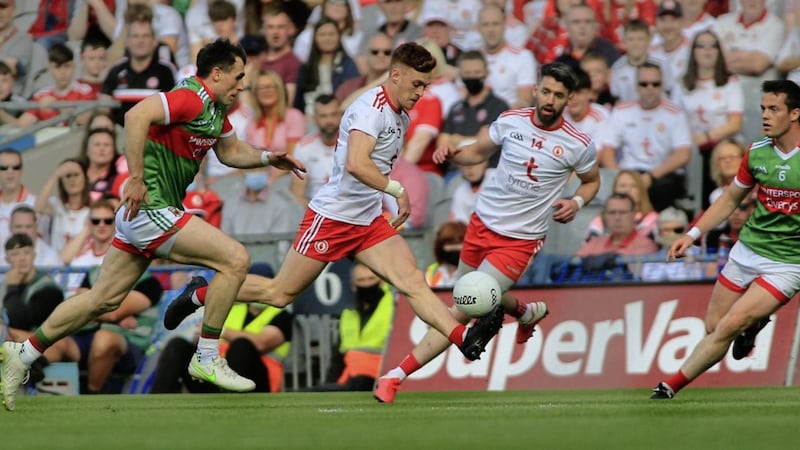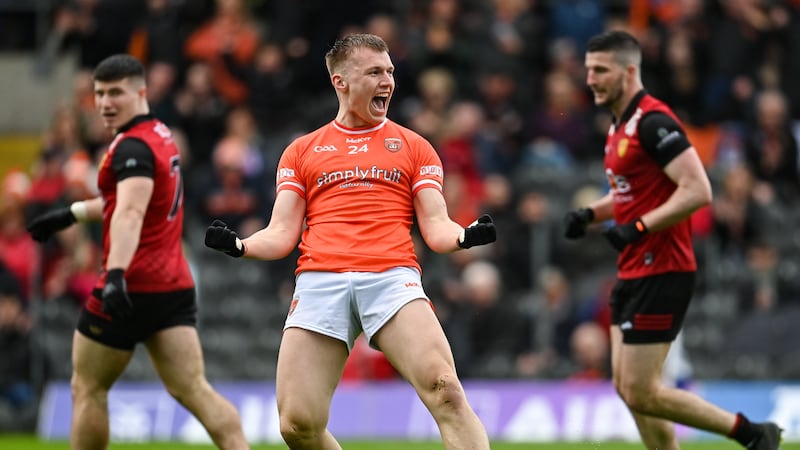I HAD the pleasure of speaking to a man who played Gaelic Football at the top level throughout the 1970s and ’80s recently.
Watch games from that era and it was hammer-and-tongs stuff - non-stop action. Great catches, big thumps, thrilling scores… All the traditional skills of the game on display. But you can tell the players trained maybe a couple of times a week and that the social side of the GAA was, perhaps not just as important as the football, but very important nonetheless.
What did the late Offaly manager Eugene McGee say on the morning of the 1982 All-Ireland when asked how badly his team wanted to win?
“There's men in that dressing room who haven't had a pint since last Wednesday night.”
In those days some of the boys might go for a couple of pints before training - never mind after it - and the result was that for every great catch there would be a dropped ball, for every great score there were a couple of bad wides.
The training was often basic – laps, sprints, laps and then a match – and the tactics were centred on competing fiercely man-on-man and getting the ball forward as quickly as possible.
We discussed this and I was pointing out the differences between the handling skills nowadays and the fitness level of the players when the former player stopped me in my tracks.
“Aye, but there was a level of physicality in those days,” he said.
“The games were very open and attacking and you can look back now and still watch the matches. I’m not too sure how many people would want to watch repeats of today’s football in 30 years.”
There’s truth in what he said.
Nowadays, players are superbly conditioned and totally dedicated. Inter-county football, and indeed club football at the top level, is a way of life and making it to the top is a game of inches that demands increasing levels of commitment to training, diet, rest and preparation.
Tyrone’s Conor Meyler revealed recently that he tapes up his mouth when he goes to bed so he breathes through his nose. Doing that, he says, has helped him to recover more quickly from a tough session or a game and his bed-time routine also includes a cold bath and opening the windows in his room to bring down the temperature.
What can you say to that except: Fair play to you Conor.
Meyler is a very talented footballer who has worked exceptionally hard to become, not just a Tyrone player, but a star of the Red Hand side that won last year’s All-Ireland. He eats and obviously sleeps football and that was evident in his performances through Tyrone’s Sam Maguire-winning run – he was just pipped at the post for Player of the Year.
That absolute selfless dedication is what enabled him to reach the level he has and it brought to mind the jingle from the TV show (ironically from back in the 1970s and ’80s) Recordbreakers.
Remember it?
“If you want to be the best and you want to beat the best… dedicationnnnnn’s what you need.”
Yes dedication is what you need, but a price has had to be paid for it which is the loss of the social side of the GAA.
Late last year another former inter-county player and manager remarked on the disappearance of the relaxed, light-hearted culture that was part and parcel of the game in his day. Back in his time, he explained, his club side did their training and then everyone went into the club for a pint or two and a game of pool and he lamented the loss of that social element.
“Now everybody just gets into their car and goes home,” he said.
That is a little sad, don’t you think, but there’s no going back.
Sprinting sessions, strength and conditioning programmes, dieticians, sports psychologists, equipment, pitches… The modern player is a superbly conditioned athlete but is the game better? Too often players don’t get the chance to show off their skills and express themselves on the pitch because the game has become weighed-down by stats and tactical straight-jackets.
The Ulster club championship semi-final between Kilcoo and Watty Graham’s Glen is a good example of that.
You had two extremely talented sides on the field but both teams were more concerned with stopping their opponent and then hitting them on the break than going out to win the game. The result was an attritional chess match.
Easy now Kilcoo and Glen, I’m not knocking what I saw and I salute you both. What we got at the Athletic Grounds was an absorbing affair in which every man gave everything for their jersey.
But the ball was rarely kicked, the kick-outs were mostly short and forwards on both sides funnelled back into their own halves to stop the other team from getting a scoring opportunity. It was a risk-free football match which was decided by one unfortunate mistake and Kilcoo progressed to a final against Derrygonnelly.
The Fermanagh champions play a similar counter-attacking style so you can expect the same in the decider on January 16.
The men of the 1970s gave all they had and produced games of highs and lows and, let’s not get all misty eyed and nostalgic here, there were some absolute stinkers in that era too. But despite their relative lack of fitness and conditioning, the entire reason for them being on the field was to express themselves and the contests they produced entertained the spectators.
Bizarrely, we now have players who are physically equipped better than ever before to produce the skills of the game but too often they don’t do that. The game has changed because the players have changed and we need to adapt.
The kick-pass rule that was tried a couple of seasons ago came and went, marks have made little impact so I think it’s time to bring in a rule that forces teams to keep at least three players in their opponent’s half at all times.
Yes, I know it would be hard to enforce that but we say that about every new rule.







